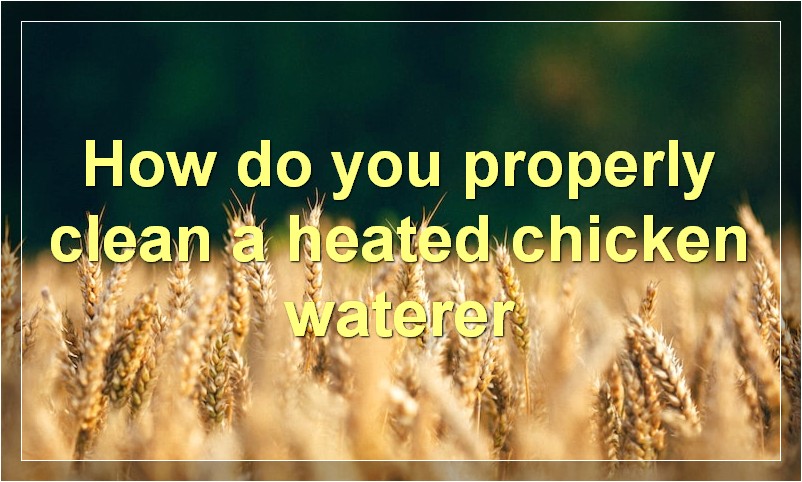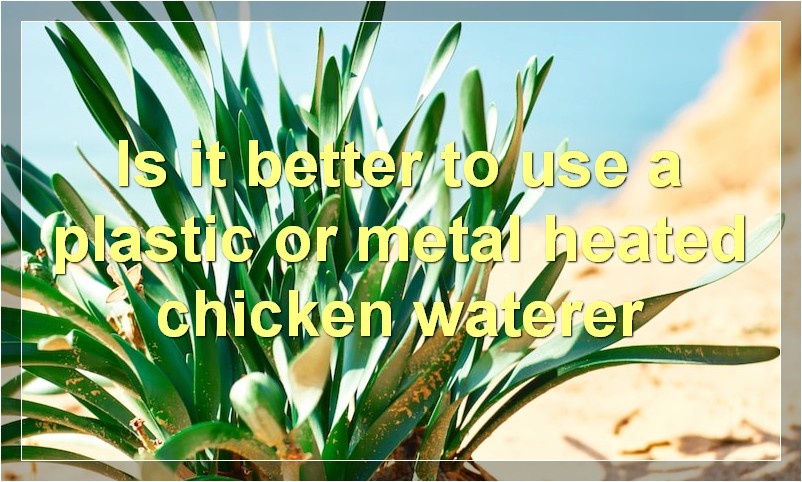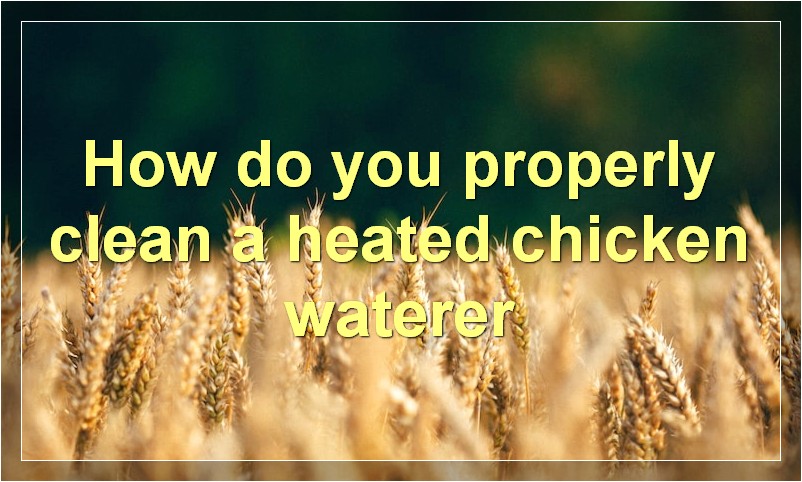Heated Chicken Waterer: Benefits, Cleaning, Changing Water, Potential Problems, Tips
If you have chickens, then you know that one of the most important things for their health and happiness is fresh water. But what if it’s cold outside and your chicken’s water froze overnight? A heated chicken waterer can be a lifesaver in these situations – and there are many other benefits to using one as well. In this article, we’ll discuss everything you need to know about heated chicken waterers, from how to clean and change the water to potential problems you may encounter.
What are some benefits of using a heated chicken waterer
wintertime can be tough on backyard chickens. Freezing temperatures make it difficult for them to get the water they need to stay hydrated. A heated chicken waterer can help ensure your flock has access to clean water year-round.
There are a few different types of heated chicken waterers available on the market. Some use a heating element submerged in the water, while others have a built-in heating element that keeps the water at a consistent temperature.
No matter which type of heated chicken waterer you choose, there are a few benefits that come with using one.
1. Heated chicken waterers help prevent water from freezing. This is especially important in colder climates where temperatures can drop below freezing for extended periods of time.
2. Heated chicken waterers can help keep water clean and free of ice buildup. This is important because chickens will not drink dirty or icy water.
3. Heated chicken waterers can help reduce stress in your flock during the winter months. Having access to clean, fresh water will help keep them healthy and happy.
4. Heated chicken waterers are easy to use and install. Most models come with everything you need to get started, including instructions.
5. Heated chicken waterers are an affordable way to keep your flock hydrated during the winter months. They typically range in price from $30 to $60, depending on the size and features of the unit.
If you live in an area with cold winters, a heated chicken waterer is a great investment for your flock. Not only will it help keep them healthy and hydrated, but it will also help reduce stress during the colder months.
How do you properly clean a heated chicken waterer

Heated chicken waterers are a great way to keep your chickens’ water from freezing in the winter. But how do you properly clean a heated chicken waterer?
First, unplug the waterer and empty any water that is left in it. Next, remove the heating element and set it aside. Now you can clean the waterer just like you would any other type of chicken waterer. Be sure to scrub the inside well to remove any bacteria.
Once the waterer is clean, you can put the heating element back in and fill it with fresh water. Your chickens will now have access to clean, fresh water all winter long!
How often should you change the water in a heated chicken waterer
It is generally recommended to change the water in a heated chicken waterer at least once a week. If the weather is particularly hot or dirty water is being used, it may be necessary to change the water more frequently.
What are some potential problems that can occur if you don’t use a heated chicken waterer
If you don’t use a heated chicken waterer, the water in the waterer can freeze, which will prevent the chickens from being able to drink. This can lead to dehydration, which can be fatal.
How do you know if the water in your heated chicken waterer is too hot or too cold
If you’re using a chicken waterer that has a heating element, it’s important to check the water temperature regularly to make sure it’s not too hot or too cold. The ideal water temperature for chickens is between 50-60 degrees Fahrenheit. If the water is too hot, the chickens will avoid drinking it and may even get scalded. If the water is too cold, the chickens will drink less and may be more susceptible to illness.
Is it better to use a plastic or metal heated chicken waterer

If you’re wondering whether a plastic or metal heated chicken waterer is better, the answer is both! Each type of waterer has its own benefits that make it the best choice for different situations. Here’s a closer look at each option:
Plastic Heated Chicken Waterer:
1. A plastic heated chicken waterer is more affordable than a metal one.
2. It’s easier to clean since there are no nooks and crannies for dirt and grime to build up in.
3. Plastic is a good insulator, so your water will stay warmer longer in a plastic waterer.
Metal Heated Chicken Waterer:
1. Metal heated chicken waterers last longer than plastic ones since they’re more durable.
2. They’re less likely to crack or break if they’re dropped or knocked over.
3. Metal conducts heat better than plastic, so your water will get hotter faster in a metal waterer.
How do you keep a heated chicken waterer from freezing in winter
When the weather outside starts to turn cold, many people start to worry about their chickens. One of the main concerns is whether or not their chicken waterer will freeze.
There are a few things that you can do to help prevent your chicken waterer from freezing. First, make sure that the waterer is in a protected area. If possible, put it inside a shed or garage. You can also insulate the waterer by wrapping it in a towel or blanket.
Another thing that you can do is to regularly check the water level and add more if necessary. The water will evaporate more quickly in colder weather, so you may need to top it off more often than usual.
If your chicken waterer does freeze, don’t panic! Just remove the ice and add some warm water. Your chickens will be just fine.
What are some tips for using a heated chicken waterer
1. Always make sure the cord is away from the chicken coop and out of reach of any animals that could potentially chew on it.
2. Inspect the waterer regularly to ensure that it is clean and free of any debris.
3. If using a metal waterer, be sure to wrap the cord with tape or another insulation material to prevent electrocution.
4. Make sure the waterer is placed in an area where it will not be exposed to direct sunlight, as this could cause the water to overheat.
5. Use a thermometer to regularly check the water temperature to ensure it is not too hot or too cold for the chickens.
How do I troubleshoot my heated chicken waterer
If your heated chicken waterer is not working properly, there are a few things you can do to troubleshoot the issue. First, check to make sure that the unit is plugged in and that the outlet is working. Next, check the water level in the unit. If the water level is low, refill it and see if the unit will heat up properly. If the unit still isn’t working, try resetting it by unplugging it for a few minutes and then plugging it back in. Finally, if the unit still isn’t working, you may need to replace the heating element.
Where can I buy a heated chicken waterer
There are many places where you can buy a heated chicken waterer. You can find them at most farm supply stores or online. Heated chicken waterers are a great way to keep your chickens’ water from freezing in the winter.

